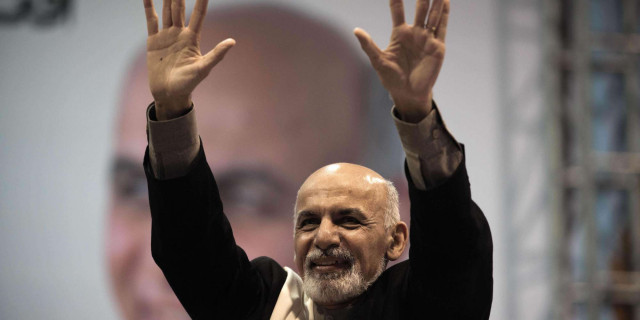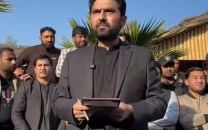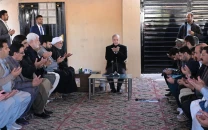Afghans frustrated with national unity govt’s 100-day performance
Conflict of interest between Ghani, Abdullah blamed for delay in forming cabinet

Ghani has yet to take any visible steps for peace dialogue with the Taliban. PHOTO: REUTERS
Major lapses of governance on the part of President Ashraf Ghani and Chief Executive Abdullah Abdullah, protracted delays in forming a consensus cabinet and the peace process with the Taliban have left them in a quandary.
Ghani was inaugurated as Afghanistan’s president on September 29 after the US brokered a power-sharing deal between him and Abdullah. The government completed 100 days on January 6.

During this period, the government has failed to achieve its goals. According to SadRoz, a watchdog body based in Afghanistan, the national unity government has fulfilled only four of its 110 promises which include signing a controversial security pact with the US.
A report by another independent monitoring body reveals that President Ghani has successfully enacted a law to provide access to information and lifted the travel ban on The New York Times reporter Matt Rosenberg. Furthermore, the president has merged a Karzai-era administrative office with president’s chief of staff office.
However, one of the major achievements which the watchdog, Afghan media and analysts have failed to detect is Ghani’s achievement to bury the hatchet with Pakistan and lay the foundation for a new chapter in bilateral relations.
Conflict of interest
A vast majority of Afghans have voiced concern over the Ghani government’s inability to meet its own 45-day deadline to form a cabinet. Even though it has been in power for 100 days, the government has repeatedly delayed the formation of a cabinet. It is widely believed that a delay in forming the cabinet has negatively impacted the security and economic situation in the country.
A conflict of interest between the president and the chief executive is blamed for the delay in the formation of cabinet. The two leaders had agreed to share power equally but have yet to announce names of ministers.
Ghani appears to be under pressure to accommodate groups and powerful individuals who had backed him during the two rounds of elections.
Some analysts are of the view that people are losing trust in the new government which could undermine its legitimacy. Others believe the ministries of foreign affairs and interior are said to be the bone of contention as both Ghani and Abdullah are interested in controlling key ministries.
Speaking on Tolo TV, Senator Gul Ahmad Azami insisted the division of powers between President Ghani and Dr Abdullah is the main obstacle to the formation of a cabinet.
According to an insider, Ghani had been contemplating including at least one former Taliban leader in his cabinet. However, Taliban spokesman Zabihullah Mujahid has maintained that the Taliban cannot envisage joining a government which has been installed by the US Secretary of State in Kabul.
Some government officials claimed the president also wants to provide representation to Hekmatyar-led Hizb-e-Islami. However, a spokesman for the party insists the government has not offered any cabinet position to them.
Dr Ghairat Baheer, who heads the party’s political committee, said they had earlier indicated that a coalition government would fail in Afghanistan.
“Our predictions have now come true,” Ghairat told The Express Tribune on Friday. “President Ghani and others have not been able to form the cabinet over the last three and a half months.”
However, he added the party is not opposed to political dialogue with the government as it could resolve a large number of issues. The media has also criticised the government for failing to achieve its goals. They have urged the president and the chief executive to resolve their dispute and form a cabinet.
Sarnawesht, a private newspaper in Afghanistan, said the country has experienced major security lapses in the first 100 days of the government which can be only be resolved if the president and chief executive take more initiative.
Meanwhile, Mandegar, another private newspaper, claims the government has managed to draw attention from the international community and develop a strategy to tackle the insecurity in the absence of foreign troops.
Peace dialogue
President Ghani has yet to take any visible steps for peace dialogue with the Taliban.
The government-sponsored High Peace Council has dismissed reports of peace talks with the Taliban in Qatar last month as false. According to the council, the Taliban are reluctant to hold talks with the government after Ghani signed the BSA and will uphold this stance until foreign troops leave the country.
Published in The Express Tribune, January 10th, 2015.



















COMMENTS
Comments are moderated and generally will be posted if they are on-topic and not abusive.
For more information, please see our Comments FAQ